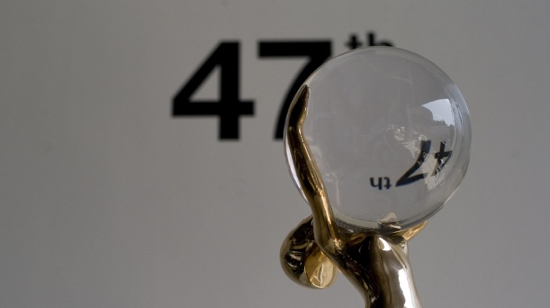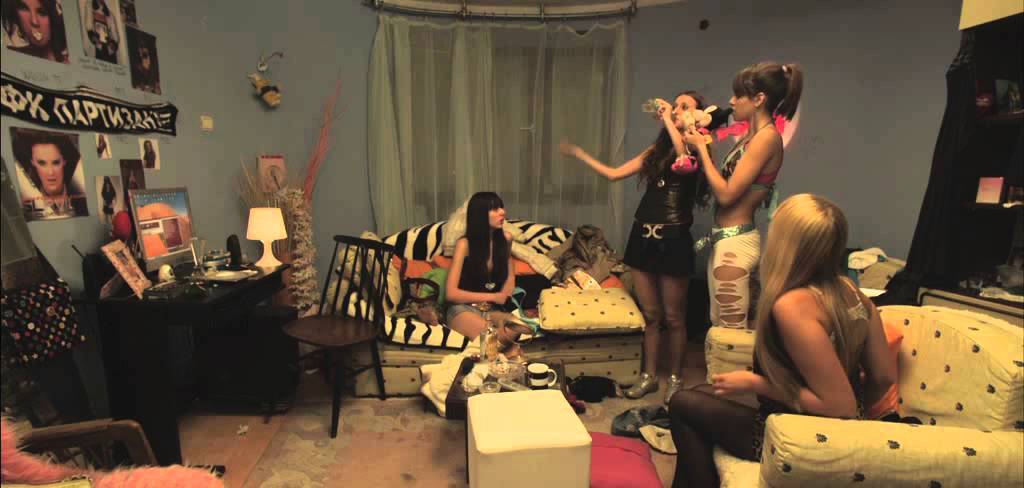Welcome to the 47th annual Karlovy Vary International Film Festival, a summer fixture in this fairy-tale spa resort, nestled in a wooded ravine in the northwest corner of the Czech Republic. In case anyone might forget, the ’47th’ logo is emblazoned throughout the town, most notably in 30-feet-high letters on the towering exterior walls of the festival’s main hub, the Hotel Thermal, a hulking great slab of Soviet-era sci-fi brutalism.
Prominent erections of another kind are hard to avoid in the festival programme, figuring heavily in the sexually supercharged savage-teen drama Clip from Serbian first-timer Maja Milos. The minimalist Greek austerity fable Boy Eating The Bird’s Food from director Ektoras Lygizos goes one better, its young star Yiannis Papadopoulos masturbating into his hand on screen, then appearing to swallow a handful of his own – ahem – gentleman’s relish.
With an emphasis on young talent from central and eastern Europe, the festival has an eclectic selection from Poland and Austria, including Jan Jakub Kolski’s psychotic hitman thriller To Kill a Beaver and Hüseyin Tabak’s Your Beauty Is Worth Nothing, a charming portrait of a sensitive young Turkish boy growing up in modern-day Vienna. Iranian cinema also figures strongly, including Mani Haghighi’s Modest Reception, a dark parable about a wealthy Tehran couple handing out sacks of money, and Ali Mosaffa’s literary love triangle The Last Step, which stars Leila Hatami, fresh from the Oscar-winning A Separation.
Karlovy Vary has long had its own sidebar of music-themed films and rock documentaries, which this year seems to spill over more into the main programme. The festival opens with Good Vibrations, a biopic of Belfast punk godfather Terri Hooley, and closes with Don’t Stop, a sweet but formulaic Czech rites of passage drama about an aspiring punk band in early ’80s Prague. In between there are films on Brian Eno, Paul Simon and more. Below is a list of six of the best from the fest – some fantastic, some flawed, but all interesting efforts.
Good Vibrations
Opening the Karlovy Vary programme, despite the reported distaste of the festival director, this lively rock biopic dramatises the rise, fall and rise again of Belfast punk legend Terri Hooley. An irreverent hippie reggae fan who defied sectarian boundaries, opened a landmark record shop, founded a punk label and discovered The Undertones, Hooley is portrayed here by big screen novice Richard Dormer as a boozy rascal with a great ear but terrible business sense. The relentlessly sunny story feels simplified and sanitised, with too many miscast actors in bad wigs – Feargal Sharkey and John Peel both grate, for example. But no matter, as co-directors Lisa Barros D’Sa and Glenn Leyburn have essentially made a broad-brush Belfast version of 24 Hour Party People, with backing from the same production company, Revolution Films.
Clip
Picking up awards and provoking divisive reactions on the festival circuit, Clip puts a contemporary Balkan spin on the classic teens-gone-wild plot. Isidora Simijonovic plays Jasna: a sulky, schoolgirl beauty from Belgrade’s rough suburbs with a hellish home life and a busy but mostly degrading sex life with her bullying on-off boyfriend. He hits her, and it feels like a kiss. Directed with explosive energy by actor turned director Maja Milos, this highly assured debut cleverly incorporates footage shot on hand-held smartphones. It will doubtless grab headlines for its extremely graphic sex scenes, but is also notable for its fine young cast and in-your-face depiction of druggy adolescent parties powered by Serbian ‘turbo-folk’ music, a rowdy kind of Eurovision punk-pop. There are shades of Larry Clark’s Kids and Catherine Hardwicke’s Thirteen here, but Clip is less prurient or judgmental than either. Some may find this savage love story sensational and nihilistic – but anyone with teenage nieces, nephews or kids of their own is more likely to wince with recognition.
A Respectable Family
There are echoes of Hitchcock, Costa-Gavras and Polanski in this terrific Iranian suspense thriller. Considering the shameful government mistreatment of filmmakers such as Jafar Panahi, it is remarkable that Iran still has a cinema scene at all, never mind the world-class community of actors and directors who choose to remain in their homeland and dance around the regime’s repressive restrictions. Massoud Bakhshi is one of the rising stars who has chosen to stay, a former documentary director who makes his full-length dramatic feature debut with this classy twist on Cain and Abel, which links the martyrs of the Iran-Iraq war in the 1980s to a contemporary Kafkaesque tangle of greed, violence and corruption. In Bakhshi’s bittersweet love letter to his homeland, the political subtext is subtle, the message universal.
Grabbers
An idyllic tourist isle off the rugged coast of Ireland is invaded by extraterrestrial squid monsters in director Jon Wright’s cheerfully trashy horror comedy, which falls somewhere between Shaun Of The Dead and Father Ted. Richard Coyle plays the island’s hard-drinking local cop, Ruth Bradley the straight-laced rookie newly arrived from Dublin. The script is patchy and the characters wafer-thin, but the hideous Cthulhu-type monsters and their bloodsucking splatterpunk antics make it all worthwhile. The central comic premise, that these creatures are allergic to alcohol, is an inspired twist on booze-sodden Oirish screen stereotypes.
Hell
Not content with freezing mankind to near extinction in his 2004 eco-blockbuster The Day After Tomorrow, German-born disaster movie mogul Roland Emmerich swings the temperature gauge the other way as executive producer of this sun-scorched, post-apocalyptic, sci-fi horror thriller. Playing on the title’s double resonance in German – where it also means ‘light’ – young director Tim Fehlbaum’s debut feature takes place in a near-future Europe that has become a parched, lawless, depopulated dustbowl following a cataclysmic spike in solar activity. Heading north in search of water and cooler climes, a ragged group of survivors fall foul of a creepy backwoods religious cult of cannibalistic killers. Fehlbaum opens with a strikingly original set-up before settling into a fairly routine plot that recycles familiar tropes from Mad Max, 28 Days Later and others. All the same, Hell looks fantastic, and delivers plenty of visceral genre tension.
Brian Eno 1971-77: The Man Who Fell To Earth
Everybody’s favourite egghead pop professor gets the chin-stroking rock-doc treatment in this scholarly but ultimately unsatisfying yak-fest. Director Ed Haynes frames a fairly arbitrary seven-year stretch as Eno’s golden years, bookended by his Roxy Music work and mercurial contributions to Bowie’s Berlin albums. Alas, neither Eno himself nor any major collaborator contributes to this clumsily titled film, which soon becomes a steady succession of critics and biographers. In fairness, there is enough intelligent comment and analysis here to interest curious Quietus readers, but Eno deserves a better film than this – indeed, the recent BBC Arena profile Another Green World was less academic but caught its subject’s playful, sensual, irreverent nature much better. Too many talking heads here, but sadly no Talking Heads.




